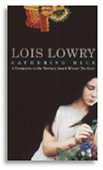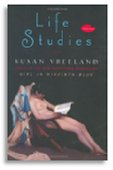Messenger is the third book in a futuristic trilogy by Lois Lowry that includes The Giver and Gathering Blue. After having read Messenger, I have concluded that The Giver is the strongest of the trilogy — it has, I think, the most accessible and interesting message, and I didn’t feel it was quite as heavy-handed as the other two. I think Messenger was a bit stronger than Gathering Blue, but it still lacked some sort of cohesiveness. The story didn’t feel to me that it was completely told.
It was really good to see Jonas again, but I found it implausible that even given his gift of “seeing beyond” that he would lead a community at his age. I cannot recall where I read this, but at least one reader questioned why people in the society might have these supernatural powers — what had changed on Earth to enable people to, for instance, see across vast distances to others in trouble, to heal grievous wounds? This didn’t really bother me as I sort of decided these books were science fiction. They take place after an apparent nuclear holocaust. The survivors built different communities. We don’t really know what effect such radiation might have on people, but I am OK with the notion that some of them developed strange super-human powers. At any rate, lots of comic book heroes received their powers in such ways.
I found the society in The Giver to be the most believable. The people in that community created what they thought was a utopian society, but in reality turned into a dystopia. The society in Messenger was also utopian. Completely communist, the group helped each other and found shelter and food for newcomers. Then the society voted to close and strange things were happened when they went to “Trade Mart.” Exactly what were they trading away for the luxuries and better lives they desired? Even nature around the village started to poison and attack. I found the book to be somewhat of an indictment against how present-day Americans treat newcomers to our shores and a criticism of our materialism. One member of the community makes a Christ-like sacrifice, and things appear to be as they were before the group wanted to close — the utopia is restored.
I don’t feel I wasted my time in reading Gathering Blue or Messenger, but I wouldn’t read them again — I would read The Giver again — and I think the story was strongest when it was left at that. However, I sense that Lowry is not done with her futuristic society, and I sense an attachment between Kira and Jonas is in the works for a future book. If you read one book of the trilogy, make it The Giver and rest in the notion that the ending is happy for Jonas and Gabe.




